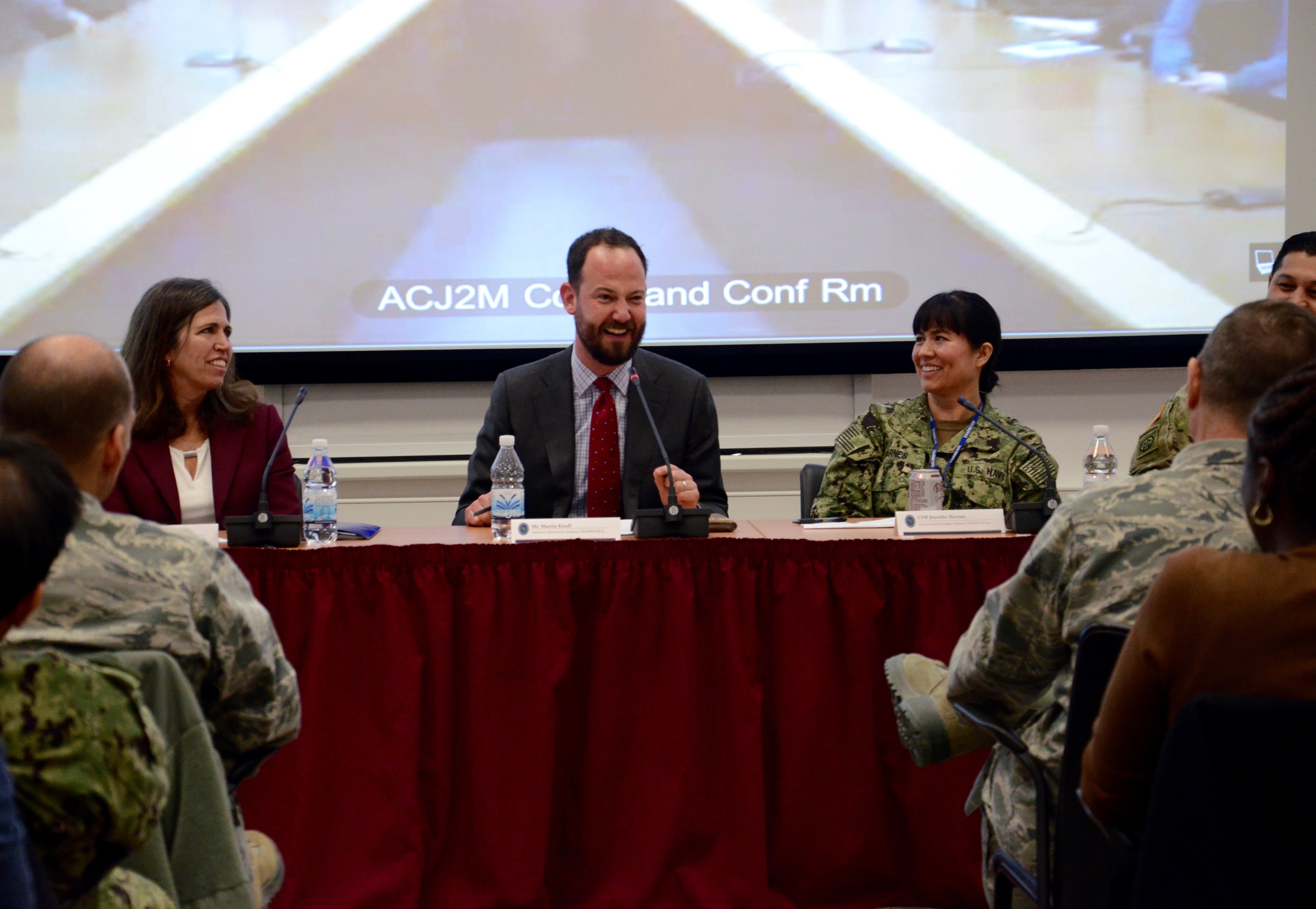
By Holly DeCarlo-White
USAG Stuttgart Public Affairs
In celebration of Women’s History Month and International Women’s Day, the U.S. Africa Command Equal Opportunity Office and the Women, Peace, and Security Working Group joined forces to organize a panel discussion, March 9, on Kelley Barracks.
The event highlighted the contributions of female officers, non-commissioned officers and civilians to the U.S. military, and the history of diversity and gender integration. The panelists shared their experiences, challenges and changes they have witnessed while leading diverse teams throughout their careers.
Ambassador Alex Laskaris, deputy to the commander for civil-military engagement, AFRICOM, opened with the stark reminder that the roles, views and treatment of women in other areas of the world are drastically different.
“Gender is not synonymous to women,” Laskaris said. “Issues of gender have to be at the forefront … These issues are central to our values and also central to our success as a command and a nation … We gender norm war with boys and peace with girls, we need to think of women as activists.”
Cori Fleser, gender advisor, AFRICOM J55, and event moderator, asked the panelists to relay their observances through their own careers.
“Everyone experiences the military differently based on who they are,” Fleser said when speaking about her first post as a Naval Officer.
“There are lots of women who have had a much more difficult career before me, to allow me to be in the position I am today,” said Cmdr. Jennifer Barnes, branch chief for international and strategic outreach, AFRICOM J55 International Division.
“I never got the ‘bro shake; I was never in the club,” she said.
Barnes, a Naval Foreign Area Officer and pilot who flew EA-6B Prowler electronic warfare aircraft, said the Naval Academy has almost tripled female enrollment to 27 percent compared to about 10 percent during the time when she began her career.
During the first class of Ranger school that integrated women in 2015, Sgt. 1st Class Emmanuel Rodriguez, operations NCO, headquarters commandant, AFRICOM, was a Ranger instructor in the 5th Ranger Training Battalion.
“It was a challenge how to make everything equal,” Rodriguez said, noting small changes that needed to be made to make it work, such as privacy in the restrooms, and updates to what was allowed on the packing list. Even with those changes, “we kept everything equal, and the integrity remained the same, including male PT test standards. Women also had to shave their heads.”
Rodriguez also said it was a challenge to shift the mind-set from a previously male environment not to say things, even in jest, such as “You got beat by a girl!” In reality, the women were doing the same – or more – as the men.
Retired Brig. Gen. Kim Field, area director, countering violent extremism practice at Creative Associates International, spoke to the importance of confidence within one’s self, in leadership and among colleagues. When Field began a new job that was outside her comfort zone of previous experience working for a commander, Field said, “I had to look at myself and say, I could do it … I stopped worrying about what my male counterparts were thinking … trusting my male colleagues to see what I brought to the table was a good approach for me … he picked me for a reason.”
Field is a former a deputy assistant Secretary of State for African, East Asian, Pacific and South and Central Asian Affairs in the Bureau of Conflict and Stabilization Operations.
In the intelligence community, Martin Kindl, assistant director for analysis at AFRICOM J2, Directorate for Intelligence, serves as the senior substantive authority on African issues, managing a diverse team of more than 300 intelligence analysts.
“Diversity is a force multiplier,” Kindl said. He explained numerous statistics that state a diverse workforce provides superior quality decisions, creativity and stronger work ethic. He said it is important to “foster cognitive diversity.”
Kindl added that today, the conversation of, “Should we send a woman to [blank]?,” is happening less.
“I am not as worried about young women in America moving forward,” Field said. “Appreciate everyone and what they bring to the table, and express it publicly.”
About International Women’s Day
International Women’s Day is a global day celebrating the social, economic, cultural and political achievements of women. It is a day to celebrate unity, advocacy and action. IWD has been observed since the early 1900’s – a time of great expansion and turbulence in the industrialized world that saw booming population growth and the rise of radical ideologies. International Women’s Day is a collective day of global celebration and a call for gender equality. For more information visit https://www.internationalwomensday.com
